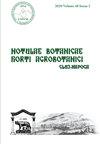纳米二氧化硅颗粒在提高谷类作物耐旱性方面的作用
IF 1.3
4区 生物学
Q3 PLANT SCIENCES
引用次数: 0
摘要
谷类作物对提供人类日常饮食中必需的营养和能量至关重要。此外,谷类作物作为牛饲料的重要成分,在提高肉类产量方面也发挥着至关重要的作用。干旱作为一种非生物胁迫因素,对全球众多作物的生长和产量产生了不利影响。这一问题对维持全球谷类作物生产和确保粮食安全构成了重大而紧迫的障碍。纳米粒子已成为在当前快速的气候变化和不断升级的干旱条件下提高谷类作物产量和生产率的宝贵资源。其中,二氧化硅纳米粒子(SiNPs)已经证明了其在水资源有限地区的农业应用潜力。干旱胁迫对谷类作物有不利影响,会影响其生长、代谢和生理过程,阻碍水分和养分的吸收,破坏细胞膜,损害光合装置,并通过改变基因表达降低抗氧化活性。SiNPs 有助于保护细胞膜,调节水分平衡,改善水分和养分的吸收,从而大大促进植物在缺水条件下的生长。SiNPs 还能保护光合系统并提高其效率,促进酚类物质、激素、渗透溶质、抗氧化活性和基因表达的积累,从而增强植物对干旱胁迫的抵抗力。此外,SiNPs 主要通过促进脱落酸(ABA)的积累来促进气孔关闭,从而减少叶片失水,并通过激活抗氧化防御系统和减少活性氧(ROS)来减轻氧化胁迫损伤。然而,对 SiNPs 在干旱胁迫条件下对谷类作物的作用进行研究的数量有限。在这篇综述中,我们强调了 SiNPs 在通过改变谷类作物的形态-组织学特征、抗氧化特性和基因表达来提高其抗逆性以维持干旱易发地区粮食安全方面的巨大潜力。这项研究将有助于研究人员利用 SiNPs 作为一种无害环境的方法来提高谷类作物的抗旱性,以满足全球粮食供应的需求。本文章由计算机程序翻译,如有差异,请以英文原文为准。
Role of silica nanoparticles in enhancing drought tolerance of cereal crops
Cereal crops are essential for providing essential nutrients and energy in the daily human diet. Additionally, they have a crucial role as a significant constituent of cattle feed, hence enhancing meat production. Drought, being an abiotic stressor, adversely affects the growth and yield of numerous crops on a global scale. This issue poses a significant and pressing obstacle to maintaining global cereal crop production and ensuring food security. Nanoparticles have become a valuable resource for improving cereal crop yield and productivity under ongoing rapid climate change and escalating drought conditions. Among these, silica nanoparticles (SiNPs) have demonstrated their potential for agricultural applications in regions with limited water availability. Drought stress has detrimental effects on cereal crops, impacting their growth, metabolic, and physiological processes, hampering water and nutrient absorption, disrupting cellular membranes, damaging the photosynthetic apparatus, and reducing antioxidant activities by altering gene expression. SiNPs help preserve cellular membranes, regulate water balance, and improve water and nutrient absorption, resulting in a substantial enhancement in plant growth under water-deficit conditions. SiNPs also protect the photosynthetic system and enhance its efficiency, facilitate the accumulation of phenolics, hormones, osmolytes, antioxidant activities, and gene expression, thus empowering plants with increased resistance to drought stress. Moreover, SiNPs decrease leaf water loss by promoting stomatal closure, primarily by fostering the accumulation of abscisic acid (ABA) and mitigating oxidative stress damage by activating the antioxidant defence system and reducing reactive oxygen species (ROS). However, a limited number of studies examine the role of SiNPs in cereal crops under drought stress conditions. In this review, we highlighted the promising potential of SiNPs to improve cereal crop resilience by changing morpho-histological traits, antioxidant properties, and gene expression to maintain food security in drought-prone areas. This study will aid researchers in using SiNPs as an environmentally benign way to improving drought resistance in cereal crops in order to fulfill global food supply needs.
求助全文
通过发布文献求助,成功后即可免费获取论文全文。
去求助
来源期刊

Notulae Botanicae Horti Agrobotanici Cluj-napoca
PLANT SCIENCES-
CiteScore
2.70
自引率
0.00%
发文量
118
审稿时长
3 months
期刊介绍:
Notulae Botanicae Horti Agrobotanici Cluj-Napoca is a peer-reviewed biannual journal aimed at disseminating significant research and original papers, critical reviews and short reviews. The subjects refer on plant biodiversity, genetics and plant breeding, development of new methodologies that can be of interest to a wide audience of plant scientists in all areas of plant biology, agriculture, horticulture and forestry. The journal encourages authors to frame their research questions and discuss their results in terms of the major questions of plant sciences, thereby maximizing the impact and value of their research, and thus in favor of spreading their studies outcome. The papers must be of potential interest to a significant number of scientists and, if specific to a local situation, must be relevant to a wide body of knowledge in life sciences. Articles should make a significant contribution to the advancement of knowledge or toward a better understanding of existing biological and agricultural concepts. An international Editorial Board advises the journal. The total content of the journal may be used for educational, non-profit purposes without regard to copyright. The distribution of the material is encouraged with the condition that the authors and the source (Notulae Botanicae Horti Agrobotanici Cluj-Napoca or JCR abbrev. title Not Bot Horti Agrobo) are mentioned.
 求助内容:
求助内容: 应助结果提醒方式:
应助结果提醒方式:


